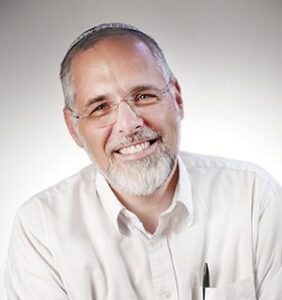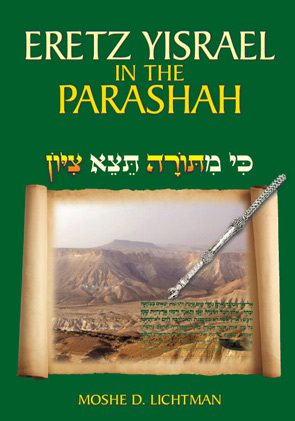WOMEN AND THE LAND OF ISRAEL
by Rabbi Moshe D. Lichtman [for more of his works, see https://toratzion.com/]

This week’s parashah contains the story of B’not Tzlofchad, those courageous and
idealistic women who cherished the Land of Israel and demanded a portion in it. The first
verse states, – The daughters of Tzlofchad, son of Chefer, son of Gil’ad, son of Machir, son of
Menasheh – of the families of Menasheh son of Yosef – drew near (27:1). Rashi comments:
OF THE FAMILIES OF MENASHEH SON OF YOSEF: Why is this stated? Does it not already say,
son of Menasheh? It is to teach you [that just as] Yosef cherished the Land – as it says,
– You shall bring up my bones… (BeReishit 50:25) – [so too] his daughters cherished
the Land, as it says, – Give us a portion (27:4).
A few verses earlier, after recording the census of Moshe and Elazar, the Torah states: –
But among these, there was not a man of those whom Moshe and Aharon the Kohen
counted… For the Lord had said of them, “They shall surely die in the wilderness,” and not a
man was left of them, except for Calev son of Yefuneh and Yehoshua son of Nun (26:64-65).
Rashi, quoting BeMidbar Rabbah (21:10), derives from here that the daughters of Tzlofchad
were not the only women who loved the Land:
AMONG THESE, THERE WAS NOT A MAN: But the women were not included in the decree of
the Spies, for they cherished the Land. The men said, – Let us appoint a leader and
return to Egypt (BeMidbar 14:4), while the women said, Give us a portion. This is why
this section is juxtaposed to the section of B’not Tzlofchad.
To help us appreciate the contemporary significance of these words of Chazal, I would like
to copy (with permission) part of an article entitled “Women and Eretz Yisrael,” written by a
true lover of Zion, Mrs. Shifra Slater. It is taken from To Dwell in the Palace (Feldheim
Publishers, pp. 61-63.) There the author writes:
This theme [that women often have a clearer perspective on things] was repeated more
than once while bnei yisroel were in the desert. But never was it as plain as in the sin of
the spies. On this occasion the men of Israel – but not the women – made a drastic mistake.
Spurning the cherished Land of Israel, they foiled the geula. Six hundred thousand men,
great and wise men, accepted the evil report of their leaders. They simply could not see
through the visible “realities” in the Land. All they saw was fortresses and death,
Amalek and giants. They, after all, as men, had in-depth knowledge of many aspects of
the situation. The men knew how unskilled the Jews were in the martial arts; they appreciated the particulars of the agricultural work that faced the nation; they had learned well the commandments warning us against the Amalekite people. And so they reached a pessimistic conclusion. The men wept, causing catastrophe, earning perdition.
(Bemidbar 14)
But no woman shed a tear. The women, once again, maintained their perspective.
True, the women lacked the detailed knowledge of the Land’s circumstances which the
men had. But they knew that reality could be defined only in terms of God’s promise.
The apparently insurmountable hurdles would somehow disappear. No matter how
things looked, all that mattered was the will of the Almighty. Their reward was entry
into the Land God promised to the Jews. Every woman in that generation merited this
great privilege. (Bemidbar 26,64)
Ah, but what a bittersweet reward! Were women created to be righteous only for
themselves? To enter Eretz Yisroel as elderly widows? Was woman not created to work
at her role of ezer kenegdo? [Literally, “a help opposing.”] If only they had mustered
the strength of a Sarah or Rivkah. They might, like their foremothers, have “opposed”
their men and, in doing so, been a real help. They might have succeeded in pointing out the truth about Eretz Yisroel, instead of allowing the men their superficial view. In this way, all might have entered together,
and the complete geula unfolded.
Is there a lesson for us today? Surely there is. No story in the Torah may be learned
without its present-day application.
With the outstretched arm of open miracles, the Almighty has indicated to us that the
time to return to Eretz Yisroel has come. A second chance, in our own days!
As women, we are in a better position to recognize this truth. For the men, finances,
security, and a host of other gigantic realities may cloud the horizon. Caught in this
tangle, they may resist the pull of the Land. They may turn their backs on this central
mitzva, on this rare privilege. If the women hold firm, we can put things into perspective for our men. Fulfillment
of the will of God is, after all, the only reality. If we rise to His expectations, He will see
to it that all the giants in the Land shrink and disappear. Holding us by the hand, He will
lead us toward His goal.
Historically, the women of Israel have succeeded in just this way. Now the final
chapters are tangibly near at hand. This is no time to fail in accomplishing our Divinely-
ordained task. Today we dare not shirk our responsibility. Let us rise to utilize our
“additional wisdom.” Recognizing that the ultimate destiny of Israel can be only in
God’s own Land, let us show our men the way, and lead them triumphantly home.






